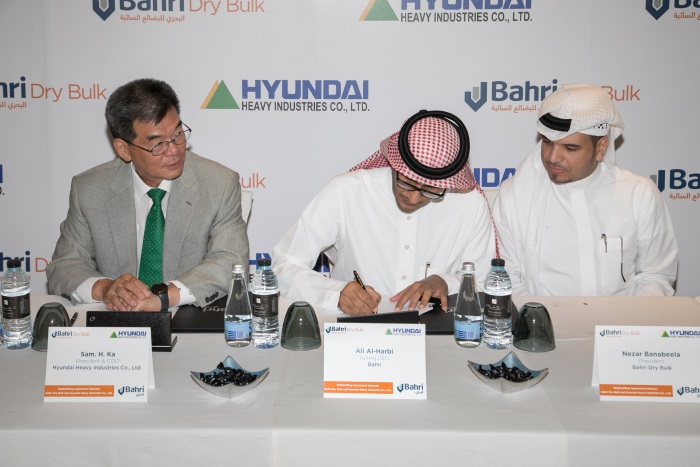The National Shipping Company of Saudi Arabia (Bahri) announced that its subsidiary, Bahri Dry Bulk Company, has signed a $120mn contract (SAR450mn) to buy four bulk carriers from South Korean ship builder Hyundai Heavy Industries.
Bahri Dry Bulk Company, which is 60% owned by Tadawul-listed Bahri, will take delivery of the ships by the first half of 2020.
The agreement was signed in Dubai, UAE, in the presence of Ali Al Harbi, acting CEO of Bahri; Nezar Banabeela, president, Bahri Dry Bulk; and Sam H Ka, president and chief operating officer (COO), Hyundai Heavy Industries (HHI) Group, in addition to other executives from both the companies, as reported by Zawya.
Al Harbi said: Our long-standing relationship with Hyundai Heavy Industries Group bears testimony to the success of the bilateral ties between Saudi Arabia and South Korea, and Bahri and HHIs shared values for long-term growth. The company, which is expanding the fleet to meet the needs of the local and global markets, said financial impact of the contract to acquire the carriers will appear after the delivery of the vessels.
Banabeela added to the subject: For Bahri Dry Bulk, the additional vessels will help to address the needs of customers in Saudi Arabia and the region as well as international companies importing grains into the kingdom; this, in turn, will enable food security for the kingdom, and through this initiative, we are proud to play an active role towards achieving an important objective of Saudi Arabias Vision 2030.
H Ka commented on the deal: “Ours is a long and special relationship that has evolved over many years, and over the course of which we have successfully delivered many other ships to Bahri including VLCCs.”
According to Bahri, the new vessels, with a capacity of 80,000 metric tonnes per carrier, are designed to the latest international technical specifications and are fitted with environmentally-friendly specifications, and enjoy high efficiency in fuel consumption.
Bahri previously reported a steep 68% decline in second-quarter profit to SAR153.9mn, from SAR487.7mn last year, and pointed to lower spot market rates particularly on oil transport during the period. The company also blamed the increase in bunker costs during the quarter, which resulted into higher bunker prices when compared with the similar period a year ago. Revenues were also lower at SAR1.3bn in the second quarter, versus the year-ago SAR1.8bn level.




